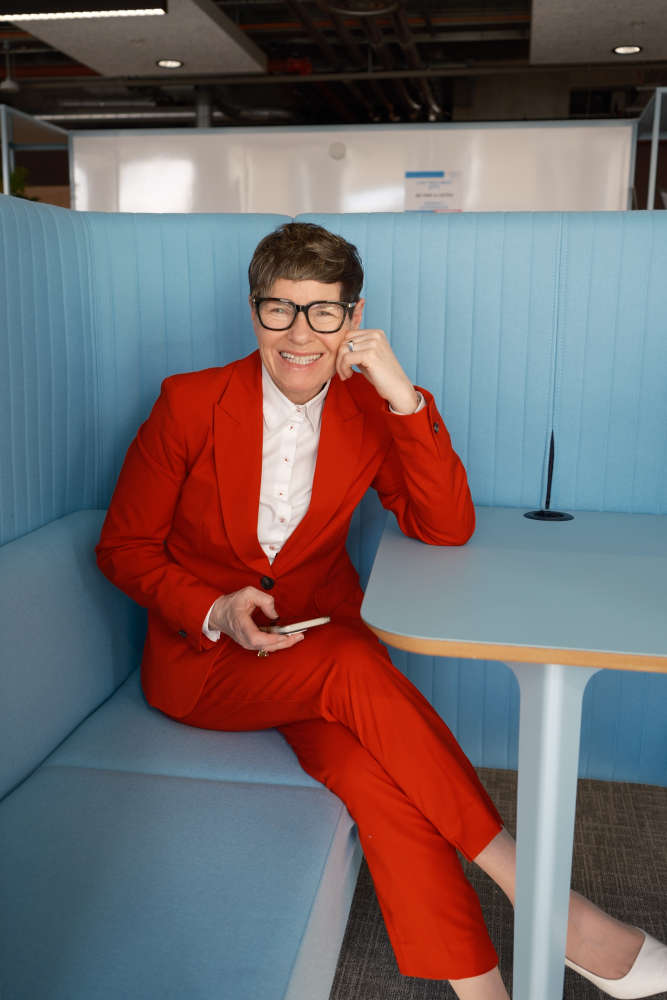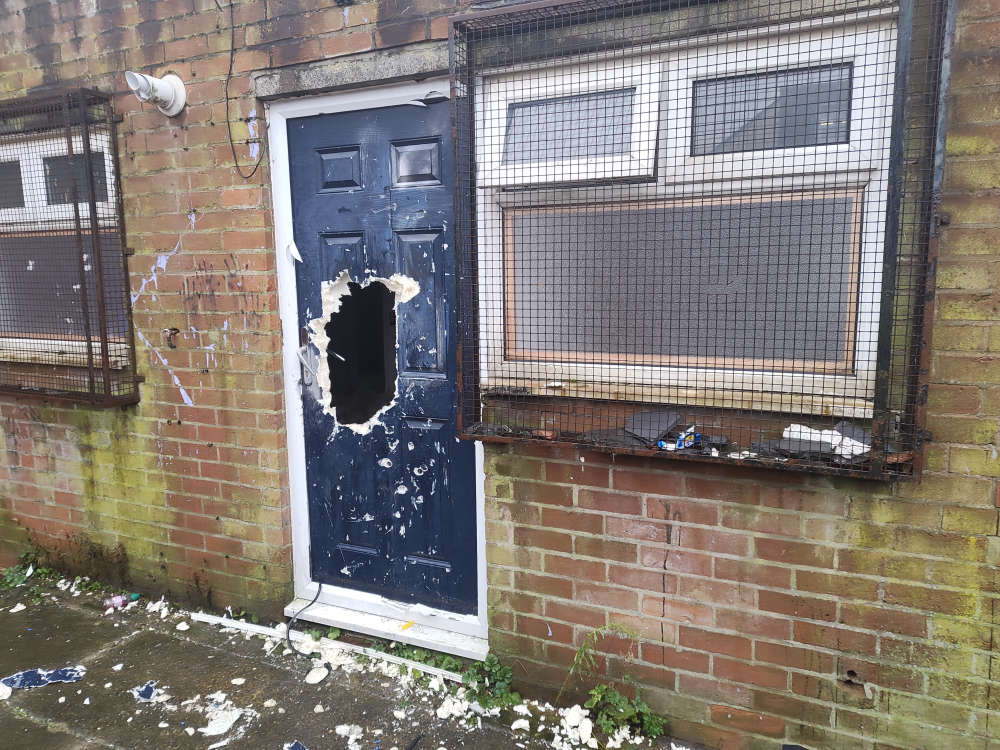
Tameside’s children’s services have been failing kids and families for a decade.
Now there is a new director in town who believes she is the one who can lift them out of inadequacy.
Jill Colbert, who started as Tameside’s director of children’s services (DCS) in January, likened herself to Man United’s latest manager Ruben Amorim.
Given this season is the Red Devils’ worst in recent memory, the jury is still out on who has the bigger rebuilding job to do.
Instead of managing high-paid sportsmen and delivering on the football pitch though, Ms Colbert has the important job of delivering for vulnerable families and children. Sitting down with the Local Democracy Reporting Service for a candid interview about the scale of the job, she half-jokingly compares how football managers have a similar lifespan in the job to children’s services chiefs.
Perched in her office on the third floor of the Tameside One building in Ashton, overlooking the building work going on in Market Square, her commitment to transparency is clear. Opening herself up to questions from the media goes above and beyond anything her predecessors have done.
Speaking about what her first day in the job looked like, the woman behind turning Sunderland children’s services from inadequate to outstanding said: “Immediately I wanted to see how the staff were feeling and how things were.
“Because I am technically the fourth DCS since last summer – including an interim who was here for the autumn who came to steady the ship whilst I was recruited.
“She brought some calm, but children’s services has experienced so much turbulence and so much change, disruption, difficulty that it is quite damaged. Both in terms of our work and how people felt.
“People felt quite scared, and still are quite worried about who is staying and who is going, because the council hired and fired at will. This is nothing that isn’t in the public domain here.
“I’m a bit like Ruben Amorim, people get that what you’ve inherited needs some significant fixing. In much the same way, you can have talent, but if you haven’t given good people creative permission to do good things – then they play bad football.
“We’re not a team, we’re not playing as a team, people aren’t playing for team Tameside.
“I think it’s been too easy for not very good people to be here because the council hasn’t had the understanding of what delivers really great services. It is a council that hasn’t been open for business.”
Before going into her brutal assessment of what has gone wrong and how she plans to rectify the situation for Tameside’s children, Jill addresses the council’s chequered history in the service.
10 years of failure
Children’s services has not been functioning well in the borough for many years now. It has never received a ‘good’ rating from Ofsted in recent memory.
But in 2016, Ofsted put the council department in special measures following an inspection, rating them ‘inadequate’. A few years later, in 2019, the service managed to improve slightly to a ‘requires improvement’ rating before slumping back into special measures in 2023.
Ofsted’s inspection in December 2023 identified ‘serious failures’ which left kids ‘being harmed’ – or at ‘risk of harm’. Inspectors criticised a reliance on agency staff, the quality of children’s assessments – which they said were ‘not good enough’ and sometimes failed to identify risk.
This came as no surprise to senior management within the town hall, who had already instigated an improvement plan months before the government watchdog’s findings were published. That improvement plan has since been scrapped and rewritten.
Going back through Ofsted reports prior to 2016, when the inspection framework was different, there were weaknesses found on numerous occasions during the watchdog’s visits.
After years of dipping in and out of serious failures, when that damning inspection report from December 2023 finally landed, it felt like crisis mode locally.
Those damning findings led to a government-appointed commissioner being brought in to keep an eye on the council. And Children’s Commissioner Andy Couldrick’s report to the government in September was scathing.
“There is a reluctance to accept responsibility collectively and corporately for the long-term service failure,” it read.
“The council, corporate and political, is quick to blame for failure: individuals, frontline staff, partners, advisors, government departments. There is far less reflection as to its own role to enable successful service delivery, know how services are performing, deliver tailored corporate support, or recognise its collective accountability.
“Children’s services failure does not happen in a vacuum: high-performing councils deliver strong services.”
That report mounted enormous pressure on the chief executive Sandra Stewart to resign. She finally stepped down on October 8. She was quickly followed out the door by council leader Ged Cooney alongside his deputies Bill Fairfoull and Jacqueline North.
Coun Eleanor Wills was brought in as the new leader and Harry Catherall was installed as interim chief executive. Since then, the council has been visited by Ofsted again during a monitoring visit, which is a check to see how improvement is going.
Their findings in February showed no signs of improvement for the service, but they did recognise recruitment of Jill Colbert and Harry Catherall as a step in the right direction. Just days after that report was published (March 25), the department was slammed by the Department for Education (DfE) for ‘poor progress’ in its efforts to improve services for children with special educational needs and disabilities (SEND).
An ‘endemic weakness’ in children’s support plans; dissatisfaction among parents and carers; as well as ‘unreasonable’ waiting times were all outlined by the DfE’s improvement notice.
This notice means Jill has to run improvement plans in both social services and the SEND service within her department.

What went wrong in the past
When asked what went wrong in the past, recruitment and bad practice came up time and time again in critical Ofsted reports – but Jill says that all points to poor management.
She said the service was either doing nothing for too long or too much too soon and ‘there didn’t seem to be middle ground’. Jill says they will suffer for a long time with demand because of this as previously failed families will more than likely be more reliant on them later on down the line.
Jill said: “What we see in our practice and what Ofsted reflected in their last letter, is that we dip in and out of families’ lives, it gets better for a while, then we say ‘we’re not going to do that’, we’re not going to work with you anymore.
“Because we’re not doing it effectively, the families come back a year later. That has happened to children in Tameside for a very long time.”
The constant ‘revolving door of staff’ is also something that is hurting children’s services. Families would not get stability in their support with constantly changing staff.
The new DCS said some staff were allowed to stay longer than they should have and loyal and hard working social workers were not given proper training, support or guidance.
“Previous improvement activities have not been effective,” Jill explained. “If I coach you to be a brilliant centre forward for example, and then you leave after three months, I then have to coach the next one and they leave. It’s just a revolving door of staff.
“You can’t fix something if you haven’t got a sustained work force who aren’t invested in getting through the hard times. Because it takes a lot longer than you’d imagine.
“If you haven’t invested in trying to recruit and keep a substantive social work workforce, you’re inevitably going to have a continuous churn of children and families.
“When you strip it back, at the end of the day, we just want to do well for children. That sounds really, ‘here comes Nanny McPhee’, but that is the point of the job.”
Jill started out as a youth justice social worker in Birmingham City Council, so has a deep understanding and a wealth of experience in the field. She pointed out how difficult the job is already, without taking into account that Tameside has some of the most deprived areas in Greater Manchester.
Although stressing that poverty does not mean neglect, Jill says it does bring additional challenges for families – which they are there to help them solve. But one of the most recent obstacles staff have faced is dealing with their own poor reputation.
Jill continued: “This is a hard career choice, there aren’t many harder jobs than going into other people’s lives and saying ‘that’s not good for your kids, how can we help you’.
“Social workers walk into people’s lives and nobody wants them there. Particularly at the minute as they go ‘we know you’re bad and you’re telling me I’m bad, you’re worse than me’.
“The poor reputation makes it massively harder.
“The way the law works is that if we have to intervene in family life, there has to be a certain threshold of risk to children. But anything below that you have to agree to work with us.”
Concluding what the issue has been for Tameside, Jill goes back to her Ruben Amorim metaphor.
“It has been a goldfish bowl – there hasn’t been meaningful intervention to make a difference. If Ruben Amorim goes next month, then standards decline because you’re trying to create a sense of team and putting rules and discipline in.
“It’s not good if you constantly have to revisit that and someone new comes in to say ‘we’re doing things like this, not like that’.”
Why her new improvement plan is any different
‘Badly’, was Jill’s answer to the question of how would her service do if Ofsted came in for a full inspection tomorrow.
A fundamental part of her plan is to make sure they recruit and retain talented and hard working people. Currently she is hiring managers to help deliver her improvement plan, which she is developing alongside her staff – something she said was unheard of under previous regimes.
Jill wants to see support plans for children cater for the actual child, rather than just tick boxes. She deems it a common sense approach, and getting staff involved is her way of making sure they buy-in to the journey.
“It’s an honour to work with families and to do a job like this,” Jill told the LDRS “Most of us are here because we want kids to have a better deal. We want them to have a good life and Tameside is a great place to live.
“I’ve already outstayed some of my predecessors. More importantly staff can tell me what is wrong, they couldn’t tell people before. This is because there was an oppressive climate really.
“I’ve got a staff reference group which is an open door, that is a great opportunity for them to shape the plan going forward. It’s about bringing back hope and optimism.
“We shouldn’t have anything to hide, we’re open for business. I know what we’re good at and what we’re not good at.
“We need a workforce who can perform to a high standard, we will never be any better without it.”
Communicating with her team, getting good management in place and supporting them in best practice is essentially what Jill’s plan is. It is about cutting through the red tape, doing the basics of social work well, tailoring care to families’ needs and supporting them earlier.
She hopes that in 18 months to two-years time there will be dramatic improvements. But the nature of council finances and the perilous tightrope they walk in terms of demand means the improvement plan could be derailed.
Jill gives an example that a truck of children could turn up one day, which would mean all their attention and resources go to them.
Speaking on her overall vision, the DCS concluded: “I would hope that we will get out of special measures by the next inspection. We will get out of inadequate if it kills me, which it may well do.
“It will take us around five years to get to a place where we have a really strong service and our operation model is the best of class.”


 Pensioner who died after being struck by van named as officers appeal to family to come forward
Pensioner who died after being struck by van named as officers appeal to family to come forward
 Council backs community-led revival of Werneth Park Music Rooms but future steps unclear
Council backs community-led revival of Werneth Park Music Rooms but future steps unclear
 FCHO chief executive Mark Gifford honoured with an OBE from The King
FCHO chief executive Mark Gifford honoured with an OBE from The King
 Fire and break-in leave £10,000 damage at Holts Community Centre
Fire and break-in leave £10,000 damage at Holts Community Centre


